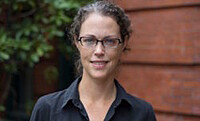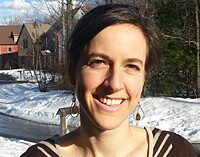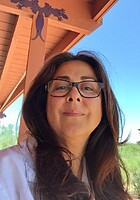Residents living in communities affected by environmental hazards often seek technical and scientific expertise, especially when they have concerns about how toxic exposures may be affecting their health. As public health professionals, we create materials that we hope will empower residents to make informed decisions on how to address exposures like drinking water contamination, power plant emissions or lead-contaminated land. We strive to make these materials understandable and accessible, and translation is a crucial – yet perhaps overlooked – part of this work.
On this call, we discussed the importance of translating our materials into other languages, and into Spanish in particular. Spanish is the second most commonly spoken language in the US, and Spanish-speaking communities may be disproportionately impacted by environmental injustices due to racial and economic disparities in the distribution of environmental burdens. The ultimate objective of working with communities is to protect their health, reduce exposures to environmental hazards, and prevent future adverse health outcomes. To achieve this goal, Spanish-speakers must have equal access to materials and resources to improve their environments.
On this call, Madeleine Scammell, DSc, Assistant Professor of Environmental Health at the Boston University School of Public Health (BUSPH), and Lena Entin, Deputy Director of Toxics Action Center, discussed the Spanish translation of the Health Studies Guide. The Guide is a product of the BU Superfund Research Program Community Engagement Core that assists community groups in deciding if a health study is an appropriate strategy for addressing and environmental health concern. Rocío Estrella, MS, Program Coordinator at the University of Arizona Superfund Research Program (UA SRP), discussed the importance and process of translation and give examples of successful translations in her work.
Featured Speakers
 Madeleine Scammell, DSc, is an Assistant Professor of Environmental Health at Boston University School of Public Health, and serves as leader of the Community Engagement Cores for the Boston University Superfund Research Program and the Center for Research on Social and Environmental Stressors in Housing across the Lifecourse. In this capacity her work includes developing mechanisms to support long-and short-term research relationships between community groups and scientists, and responding to community requests for scientific assistance. Dr. Scammell is also a JPB Environmental Health Fellow at Harvard School of Public Health. Her expertise is in the area of community-driven and community-based participatory research and includes the use of qualitative methods in the area of environmental health and epidemiologic studies. Dr. Scammell serves of the Board of Health in the City of Chelsea, MA, and on the board of directors of the Science & Environmental Health Network. Dr. Scammell was recently selected for the National Institute of Environmental Health Sciences (NIEHS) Outstanding New Environmental Health Science (ONES) award. The award will support her research on the epidemic of chronic kidney disease among agricultural workers in El Salvador.
Madeleine Scammell, DSc, is an Assistant Professor of Environmental Health at Boston University School of Public Health, and serves as leader of the Community Engagement Cores for the Boston University Superfund Research Program and the Center for Research on Social and Environmental Stressors in Housing across the Lifecourse. In this capacity her work includes developing mechanisms to support long-and short-term research relationships between community groups and scientists, and responding to community requests for scientific assistance. Dr. Scammell is also a JPB Environmental Health Fellow at Harvard School of Public Health. Her expertise is in the area of community-driven and community-based participatory research and includes the use of qualitative methods in the area of environmental health and epidemiologic studies. Dr. Scammell serves of the Board of Health in the City of Chelsea, MA, and on the board of directors of the Science & Environmental Health Network. Dr. Scammell was recently selected for the National Institute of Environmental Health Sciences (NIEHS) Outstanding New Environmental Health Science (ONES) award. The award will support her research on the epidemic of chronic kidney disease among agricultural workers in El Salvador.
 Lena Entin recently joined Toxics Action Center as Deputy Director, bringing a rich history of organizing in Environmental Justice Latino communities with Neighbor to Neighbor (N2N). She led N2N’s first environmental campaign to shut down the Mt. Tom coal plant in Holyoke, with assistance from Toxics Action Center. Under Lena’s leadership over 16 years, N2N doubled in size as she founded chapters in Fitchburg, Holyoke, and Springfield, Massachusetts, and she also led the organization’s fundraising work for two years. Lena’s organizing career began in El Salvador, where she was a community organizer and Spanish-English interpreter for U.S.-El Salvador Sister Cities.
Lena Entin recently joined Toxics Action Center as Deputy Director, bringing a rich history of organizing in Environmental Justice Latino communities with Neighbor to Neighbor (N2N). She led N2N’s first environmental campaign to shut down the Mt. Tom coal plant in Holyoke, with assistance from Toxics Action Center. Under Lena’s leadership over 16 years, N2N doubled in size as she founded chapters in Fitchburg, Holyoke, and Springfield, Massachusetts, and she also led the organization’s fundraising work for two years. Lena’s organizing career began in El Salvador, where she was a community organizer and Spanish-English interpreter for U.S.-El Salvador Sister Cities.
 Rocio Estrella, MS, joined the University of Arizona Superfund Research Program over 10 years ago where she serves as Program Coordinator. Last month, she joined Project Harvest where she works as the primary Interpreter/Translator (Spanish-English). Rocio Estrella has a Bachelor’s Degree in Agricultural Engineering (from the Instituto Tecnológico de Sonora, Mexico) and a Master’s Degree in Soil Water and Environmental Science (from the University of Arizona). She has the technical and cultural background to translate the environmental health information materials for the UA SRP and Project Harvest, rendering accurate language translation to communicate and inform effectively with people with limited English proficiency.
Rocio Estrella, MS, joined the University of Arizona Superfund Research Program over 10 years ago where she serves as Program Coordinator. Last month, she joined Project Harvest where she works as the primary Interpreter/Translator (Spanish-English). Rocio Estrella has a Bachelor’s Degree in Agricultural Engineering (from the Instituto Tecnológico de Sonora, Mexico) and a Master’s Degree in Soil Water and Environmental Science (from the University of Arizona). She has the technical and cultural background to translate the environmental health information materials for the UA SRP and Project Harvest, rendering accurate language translation to communicate and inform effectively with people with limited English proficiency.
The call was moderated by Dr. Wendy Heiger-Bernays. It lasted for one hour and was recorded for the call archive.
